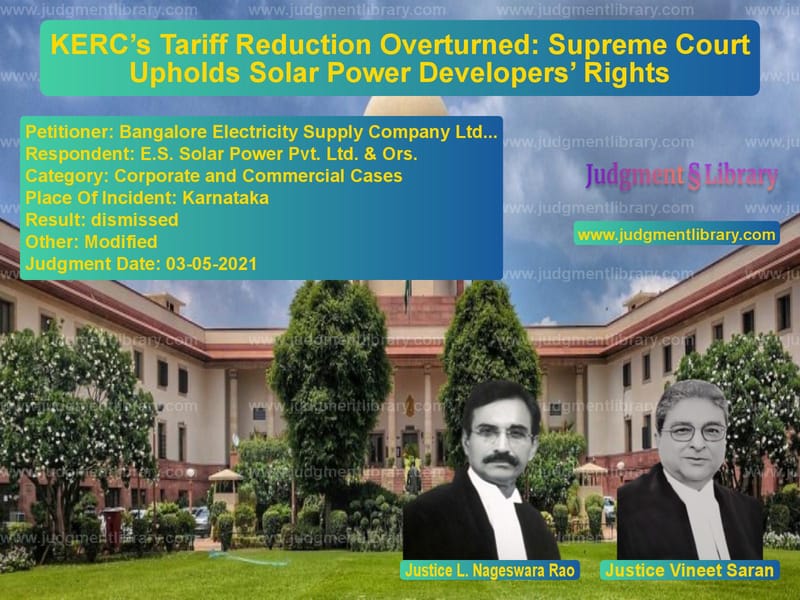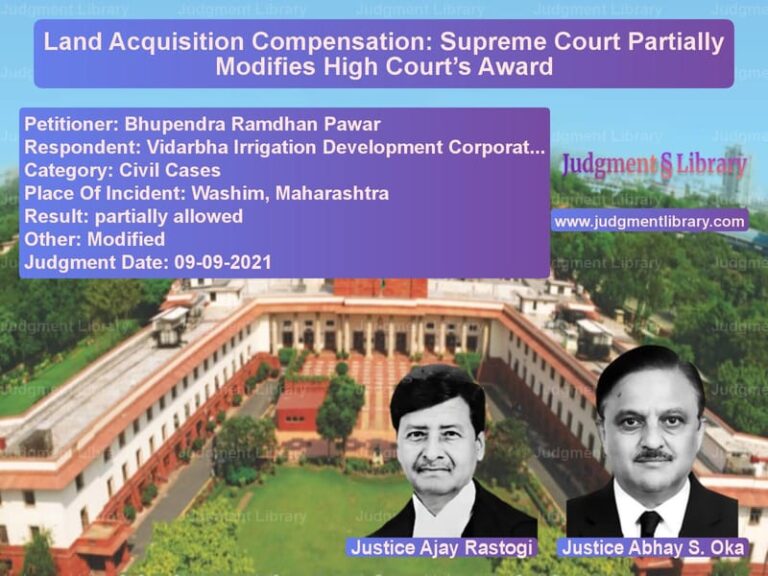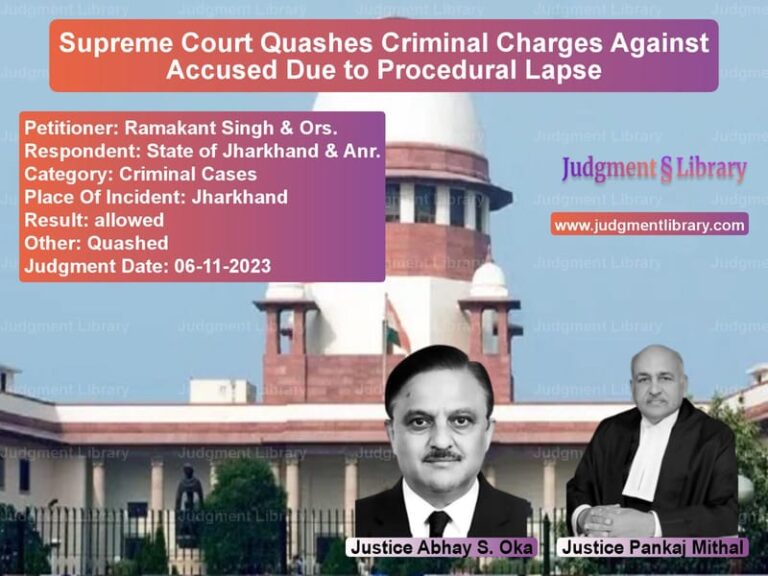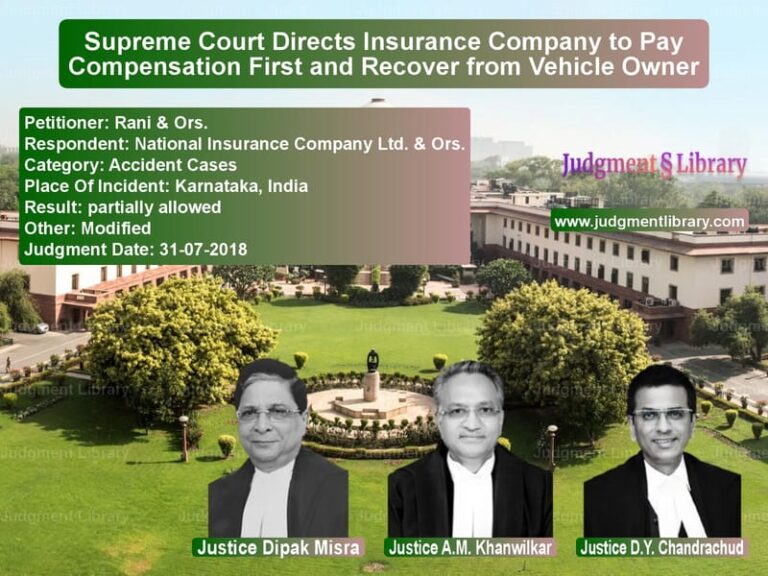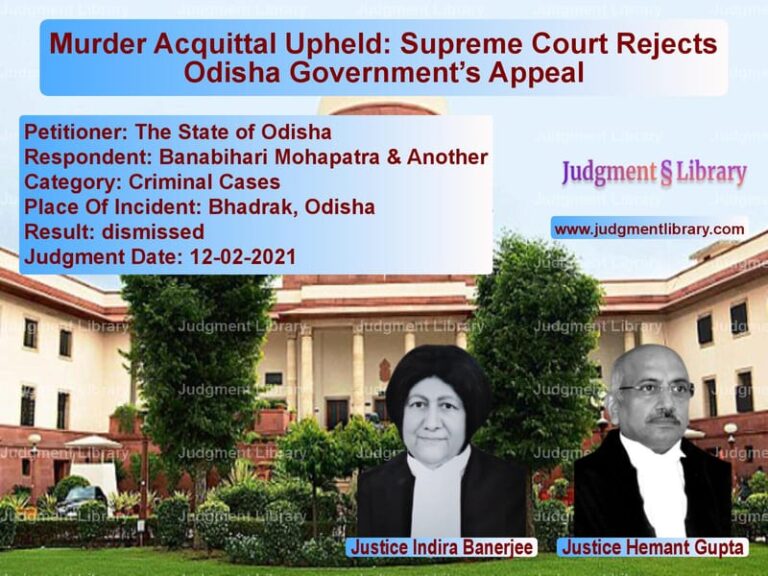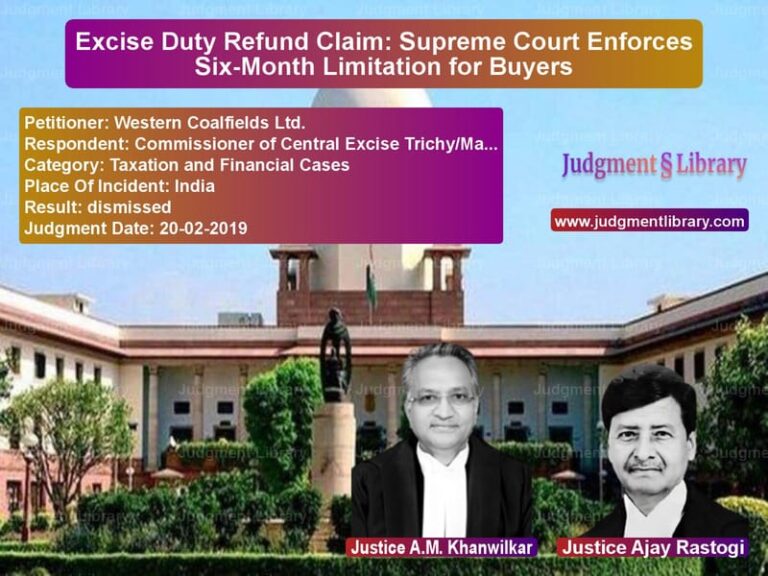KERC’s Tariff Reduction Overturned: Supreme Court Upholds Solar Power Developers’ Rights
The Supreme Court of India has upheld the decision of the Appellate Tribunal for Electricity (APTEL) in favor of E.S. Solar Power Pvt. Ltd. and others against Bangalore Electricity Supply Company Limited (BESCOM). The judgment, delivered on May 3, 2021, in Bangalore Electricity Supply Company Ltd. v. E.S. Solar Power Pvt. Ltd. & Ors., reaffirms the principles of fair contractual enforcement and prevents arbitrary reductions in tariff rates for renewable energy projects.
Background of the Case
The case arose from a dispute over the scheduled commissioning date (SCOD) of two solar power projects in Karnataka. The Karnataka Renewable Energy Development Limited (KREDL) had invited bids for setting up solar photovoltaic (PV) ground-mounted power plants in the state, under which E.S. Solar Power Pvt. Ltd. was awarded two projects:
- A 10 MW project in Bidar Rural Taluk, Bidar District.
- A 20 MW project in Bagepalli Taluk, Chikkaballapura District.
Following the award, Power Purchase Agreements (PPAs) were signed on May 23, 2016, and approved by the Karnataka Electricity Regulatory Commission (KERC) on October 17, 2016. The projects were to be commissioned within 12 months of PPA approval, meaning the scheduled commissioning date was October 16, 2017.
The key dispute arose when BESCOM imposed a reduced tariff of ₹4.36 per kWh instead of the agreed ₹6.10 per kWh and levied liquidated damages of ₹20 lakh per project, citing a one-day delay in commissioning.
Arguments by the Petitioner (BESCOM)
BESCOM, represented by its counsel, argued:
- The projects were commissioned on October 17, 2017, one day after the SCOD, making them ineligible for the higher tariff.
- Injection of power into the grid is a precondition for commercial operation, which occurred only on October 17, 2017.
- The terms of the PPA provide for a reduction in tariff if the commissioning is delayed.
- KERC correctly interpreted the agreements and imposed the revised tariff and damages.
Arguments by the Respondent (E.S. Solar Power Pvt. Ltd.)
The solar power developers, represented by Senior Advocate Basava Prabhu Patil, countered:
- The projects were effectively commissioned on October 16, 2017, as per the certification by the Karnataka Power Transmission Corporation Limited (KPTCL).
- The delay, if any, was due to procedural approvals and not attributable to the developers.
- BESCOM had no authority to unilaterally reduce the tariff when the project was completed within the contractual time.
- The interpretation of SCOD should exclude the date of PPA approval, making October 17, 2017, the actual deadline.
Observations and Judgment
1. Commissioning Date Interpretation
The Supreme Court analyzed the contractual terms and ruled:
“The computation of the commissioning date must align with the industry standard and the interpretation provided in the PPA. The exclusion of the date of PPA approval leads to an SCOD of October 17, 2017.”
2. Injection of Power into the Grid
The Court rejected BESCOM’s claim that power injection alone determines commissioning, stating:
“The presence of power evacuation infrastructure and the issuance of commissioning certificates by KPTCL confirms that the projects were ready before the alleged delay date.”
3. Fair Enforcement of Contracts
The Court criticized BESCOM’s approach and ruled:
“The unilateral imposition of lower tariffs despite timely commissioning violates the principle of fairness in commercial agreements and discourages investment in renewable energy.”
4. Liquidated Damages
The Court found no justification for BESCOM’s imposition of damages, stating:
“Where a delay is marginal and does not impact supply obligations, penalties must not be imposed arbitrarily.”
Final Verdict
The Supreme Court upheld the APTEL ruling, stating:
“The reduction of tariff and imposition of liquidated damages is illegal. The tariff of ₹6.10 per kWh shall apply, and the penalty imposed on the respondents is set aside.”
Conclusion
This judgment protects renewable energy investors from arbitrary actions by power utilities. It ensures that contracts are honored as per agreed terms and prevents the unfair imposition of revised tariffs or penalties on developers meeting contractual deadlines.
Petitioner Name: Bangalore Electricity Supply Company Ltd..Respondent Name: E.S. Solar Power Pvt. Ltd. & Ors..Judgment By: Justice L. Nageswara Rao, Justice Vineet Saran.Place Of Incident: Karnataka.Judgment Date: 03-05-2021.
Don’t miss out on the full details! Download the complete judgment in PDF format below and gain valuable insights instantly!
Download Judgment: bangalore-electricit-vs-e.s.-solar-power-pvt-supreme-court-of-india-judgment-dated-03-05-2021.pdf
Directly Download Judgment: Directly download this Judgment
See all petitions in Contract Disputes
See all petitions in Company Law
See all petitions in Judgment by L. Nageswara Rao
See all petitions in Judgment by Vineet Saran
See all petitions in dismissed
See all petitions in Modified
See all petitions in supreme court of India judgments May 2021
See all petitions in 2021 judgments
See all posts in Corporate and Commercial Cases Category
See all allowed petitions in Corporate and Commercial Cases Category
See all Dismissed petitions in Corporate and Commercial Cases Category
See all partially allowed petitions in Corporate and Commercial Cases Category

